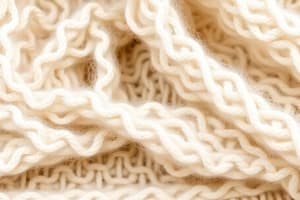Podcast
Questions and Answers
What is the primary difference between natural and synthetic fabrics?
What is the primary difference between natural and synthetic fabrics?
- Natural fabrics are more durable than synthetic fabrics.
- Natural fabrics are more expensive to produce than synthetic fabrics.
- Synthetic fabrics are more breathable than natural fabrics.
- Natural fabrics are derived from organic materials, while synthetic fabrics are man-made. (correct)
Which of the following natural fabrics is known for its smooth texture, shine, and strength?
Which of the following natural fabrics is known for its smooth texture, shine, and strength?
- Wool
- Cotton
- Linen
- Silk (correct)
Which of these synthetic fabrics is often used for knitted clothing items?
Which of these synthetic fabrics is often used for knitted clothing items?
- Polyester
- Spandex
- Acrylic (correct)
- Rayon
What property of cotton makes it great for hot weather?
What property of cotton makes it great for hot weather?
Which of the following natural fabrics is made from the fibers of the flax plant?
Which of the following natural fabrics is made from the fibers of the flax plant?
Flashcards are hidden until you start studying
Study Notes
Fabrics
Fabrics are materials made through weaving, knitting, spreading, crocheting, or bonding together fibers, thread or yarn in various ways. They can be natural or synthetic, with natural fabrics being derived from organic materials like cotton, wool, silk, hemp, flax, and jute, among others. Synthetic fabrics, on the other hand, are man-made materials like polyester, rayon, acrylic, and spandex. Here's an overview of various types of fabrics:
Natural Fabrics
Cotton
Cotton is one of the most widely used natural fabrics due to its versatility and affordability. It absorbs moisture easily, making it great for hot weather.
Wool
Wool is a type of fabric made from the fleece of sheep. It's warm, durable, and resistant to wrinkles.
Silk
Silk is another popular natural fabric known for its smooth texture, shine, and strength. It has a naturally occurring protein called fibroin that makes it strong and elastic.
Linen
Linen is made from the fibers of the flax plant. It's lightweight, breathable, and cool in hot temperatures.
Synthetic Fabrics
Polyester
Polyester is a synthetic fiber derived from petroleum products. It's strong, resists wrinkles, and is easy to care for.
Rayon
Rayon, also known as artificial silk, is made from cellulose fibers derived from wood pulp. It can mimic the look and feel of silk but tends to crease more easily.
Acrylic
Acrylic is a synthetic fiber often used for knitted clothing items. It's soft, lightweight, and can mimic the properties of wool without the issues associated with wool allergies.
Spandex
Spandex is a synthetic rubber-like material known for its incredible stretchiness. It's commonly used in workout clothes and activewear.
Fabrics play a crucial role in our lives in numerous ways. They provide comfort, protect us from the elements, serve as artistic mediums, and much more. Different fabrics have different properties, which make them suitable for specific uses and applications. Understanding these properties helps us choose appropriate fabrics for various needs.
Studying That Suits You
Use AI to generate personalized quizzes and flashcards to suit your learning preferences.


